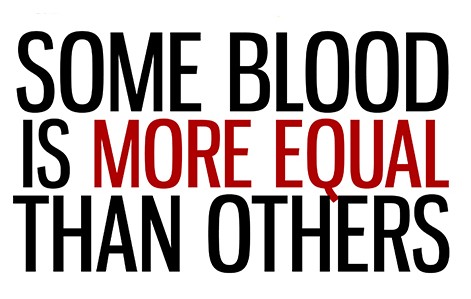Donors Denied: It’s time to end the FDA’s blood ban

When the United Blood Services came to campus to collect blood, students who identify as homosexual or bisexual were not allowed to donate because of Food and Drug Administration’s (FDA) policies that state that no homosexual person can donate blood – policies that are based on an antiquated stigma surrounding gays and HIV/AIDs. These students simply wanted to help people in need, and yet they were denied solely on the basis of their sexual orientation, which can be devastating to someone who might already feel ostracized or rejected by society.
Prior to giving blood, students have to fill out a form stating their height, age, and weight, to see if they are eligible to donate. The stringent restrictions set on weight and height are the most common reason for potential donors to be denied. However, someone who is homosexual wouldn’t even make it that far, even if they perfectly fit all of the requirements for height and weight. They are not allowed to donate blood because of a long standing and irrational stigma that gays are more susceptible to HIV/AIDS.
The FDA originally instituted regulations against homosexual blood donors in 1983 when HIV/AIDs was just emerging and little was known about the disease. According to Avert, an organization dedicated to stopping the spread of HIV/AIDs, the US first brought international recognition to HIV/AIDS after the illness was discovered as a new trend among homosexual men in 1981. Thus the association of HIV with homosexuals was born and has stuck ever since. However, we now know that AIDS and HIV can affect anyone. HIV/AIDs is not a “gay disease”, and it can be contracted and spread by anyone, regardless of sexual orientation. Therefore, it makes no sense to put restrictions on otherwise suitable candidates for donating blood.
Though years ago this may have been a rational precaution, especially given that HIV blood tests were no where near as effective as they are today, it is no longer necessary. Even if it was still a problem, all donated blood is tested to make sure it’s HIV negative. The FDA attempts to validate its policies, saying that “the HIV risk from a unit of blood has been reduced to about 1 per 2 million in the USA”, but this statistic simply does not justify the current discriminatory policies.
Recently, the FDA lifted the ban preventing homosexual people from giving blood, but its new restriction says that homosexual donors are not allowed to have sex for an entire year before donating. This rule is not only ridiculous, but nearly impossible to enforce. There is no way to tell whether a person has had sex recently or not. It may be an improvement from a complete ban, but it is still completely irrational.
According to the Red Cross, only about 38% of the U.S. population is eligible to donate blood and only 10% of people actually do. The FDA should end their antiquated and irrational policy, and allow all eligible donors – regardless of sexual orientation – the opportunity to donate blood.




1 Comment